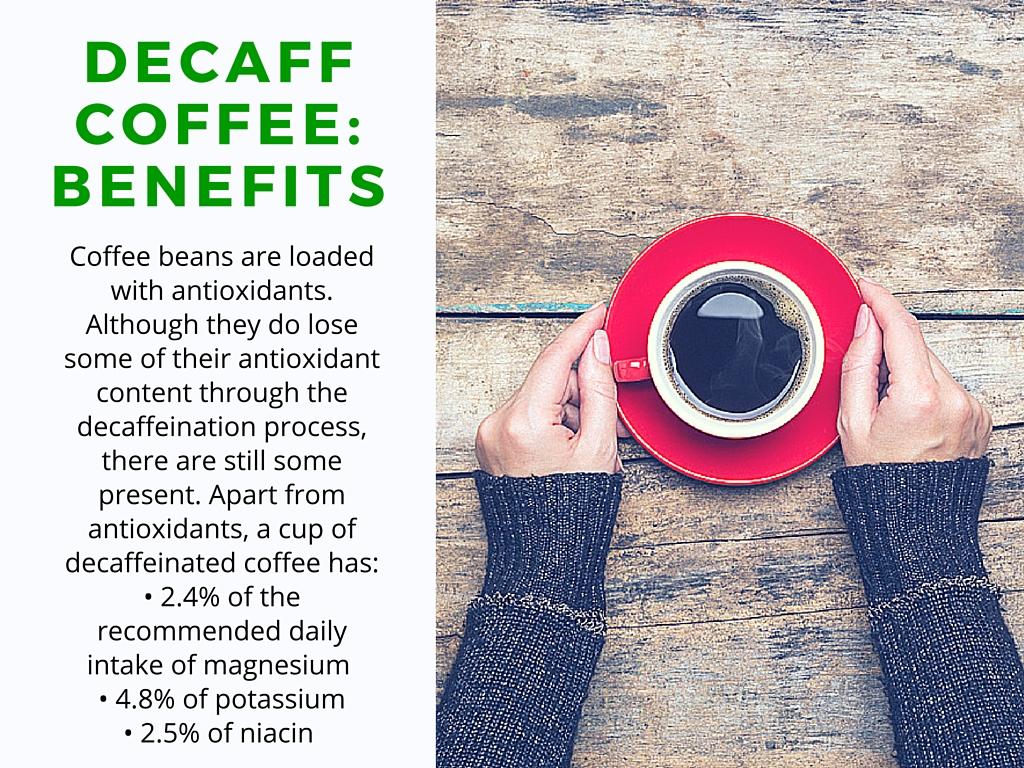 Decaffeinated coffee has a bad rap, and it isn’t surprising because decaf coffee is often found to be lacking in flavor.
Decaffeinated coffee has a bad rap, and it isn’t surprising because decaf coffee is often found to be lacking in flavor.
But some situations call for decaf and leave no other options for those who really enjoy the taste of regular coffee. It isn’t always about the caffeine.
Coffee has a rich, full-bodied taste that isn’t replicated by any other beverage. Oh, some will try to convince you that chicory can be an adequate substitute, but it’s a stretch; chicory doesn’t have the same components or flavor profile. So where does leave that us? With decaf.
If anxiety, high blood pressure, cardiovascular issues, and kidney problems plague you, drinking caffeinated coffee can be problematic: it can add to anxiety, making you shaky and nervous, and it can make you urinate more, since it acts a diuretic.
Is Decaf Coffee Bad for You?
The process of coffee decaffeination plays a large role in determining whether a particular decaffeinated coffee is bad for you. Decaf coffee comes from the same beans as caffeinated coffee—the difference is that these beans are processed in a way that removes about 97% of the caffeine. There are some concerns over the use of a solvent process to decaffeinate coffee beans, but the potential health risks are very low.
For the most part, coffee, whether caffeinated or not, is mostly good for you because the beans are loaded with antioxidants—and we know that antioxidants fight off free radicals that cause damage to our cells, which can age us prematurely and potentially cause a whole host of other health issues. That said, coffee beans do lose some of their antioxidant content through the decaffeination process, but there are still some present, so it’s beneficial all the same. Apart from antioxidants, a cup of decaffeinated coffee has 2.4% of the recommended daily intake of magnesium, 4.8% of potassium and 2.5% of niacin. There are certainly some decaffeinated coffee health benefits.

How Is Coffee Decaffeinated?
There are three common ways to make decaffeinated coffee beans (1): by using water, organic solvents (both indirect and direct methods), or carbon dioxide. The solvent-based processes use chemicals to treat the beans, whether the beans are directly immersed in the solvent or if they are processed by a method in which the solvent never touches the bean. The process not only removes caffeine but some of the taste too, making it a milder, less richly bodied beverage, and that’s where a lot of the problem lies with decaf coffee for many people.
The chemicals used, such as methylene chloride and ethyl acetate, are considered safe by the FDA (2) in the amounts used in the decaffeination process. In fact, the FDA allows 10 parts per million (ppm) of residual methylene chloride, but the coffee industry tends to use only 1 ppm. Furthermore, any residual solvent is likely to be burned away through the process of roasting the beans and later, brewing them. Still, if that chemical process bothers you, even though the risks are basically nonexistent, then look for beans that have been decaffeinated by using the Swiss Water Process or carbon dioxide. The process by which it’s been decaffeinated should be indicated somewhere on the bag of beans.
How Much Caffeine Is in Decaffeinated Coffee?
The caffeine content of decaffeinated coffee is considerably less than the caffeine content found in regular coffee (3). An eight-ounce mug of brewed decaf has two to 12 milligrams of caffeine compared to 95 to 200 milligrams in regular coffee. Doctors recommend not exceeding more than a combined total of 500 milligrams of caffeine per day, especially if you tend to suffer from headaches or anxiety. Also, consider all caffeine sources, not just coffee—soda has caffeine, as does tea and iced tea, and energy drinks are some of the worst offenders.

Because being pregnant limits how much caffeine you can consume, switching to decaf is often recommended by doctors.
Can pregnant women drink decaf coffee? Definitely! Decaffeinated coffee and pregnancy go hand in hand (4) because being pregnant limits how much caffeine you can consume, so switching to decaf is often recommended by doctors. Regular coffee is discouraged for a couple of reasons. First of all, caffeine raises blood pressure and heart rate—two things that aren’t good for pregnant women. Secondly, caffeine can transfer to the fetus, and because it’s underdeveloped, it can’t metabolize caffeine the way its mother can. Decaf coffee presents an alternative because of the minimal amount of caffeine per cup. And the antioxidant and mineral benefits can certainly help as well!
Decaffeinated Coffee Side Effects
As with regular coffee, decaf has some side effects—albeit far fewer because the caffeine content has been slashed considerably. Here are some of the side effects of decaf:
- Increases the release of gastrin, the hormone responsible for stimulating the production of stomach acid;
- Can cause mineral loss through excess production of urine;
- Increases homocysteine, an amino acid associated with an increased risk of heart disease; and
- Can increase pressure behind the eye, which can, in turn, increase the risk of developing glaucoma.
When it comes to homocysteine, it should be noted that many studies also say that coffee is good for your heart. As with many issues in food and nutrition there are opposing viewpoints, so get informed and do your research, diligently and from reputable sources, to get to the truth.
Overall, drinking decaf coffee is a good alternative for those who love the taste of coffee but can’t deal with the caffeine. Look for coffee that has been decaffeinated by the Swiss Water Process or through a carbon dioxide process. As with regular coffee, a top-quality decaf brand can deliver a rich, full-bodied, and satisfying cup of coffee. Decaf today isn’t what it was even 10 years ago, and improvements in taste are always being made; some coffee companies have even mastered the process to the point where it’s hard to discern decaffeinated coffee from regular coffee.
Read More:
